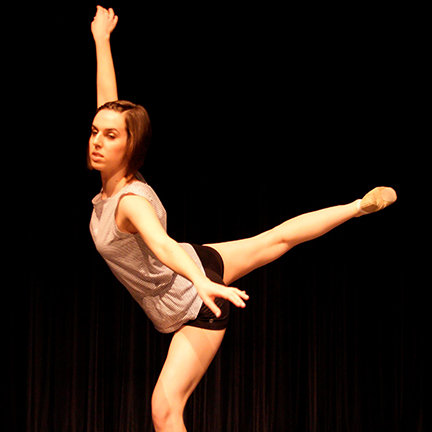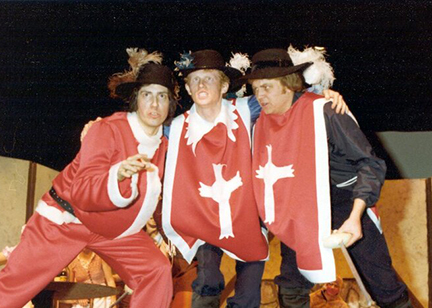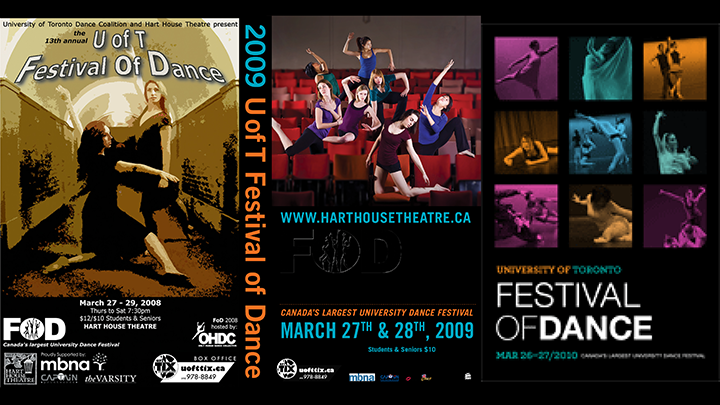Rob West and Sarah Harris, University of Toronto graduates deeply involved in Hart House Theatre, chat about their experiences as students and now volunteers; emphasize the life and career skills they developed as undergrads; and share with us precisely why Hart House is much more than a building.
Hart House Theatre spurs powerful student experiences, connecting individuals to the U of T community and the wider theatre world. Further, it provides students with life skills that prove invaluable to their career trajectories and plants the seeds for a future of dedicated volunteerism.
Two remarkable alumni are proof of this. The first is Rob West, an engineering grad who has remained intensely involved in Skule Nite, a popular student-led musical and comedy show, now in its 100th year, run by the Faculty of Engineering and held at Hart House Theatre. West has been active at Hart House for 50 years.

The second is Victoria College alumna Sarah Harris, described by Hart House Theatre’s general manager Doug Floyd as “the driving force behind the U of T Festival of Dance and key to its revitalization” in the mid- to late-2000s.
Both have incredible stories to share.
West was introduced to Hart House during his first year in Engineering (1971-1972), via a trip to the Hart House Farm. He recalls, with searing clarity, his very first time on stage at Hart House Theatre: It was February, 1973, at Skule Nite. “I remember being pushed onto the stage. I’d missed the dress rehearsal and there I stood on stage … and I suppose I’ve never left,” he humbly sums up decades of volunteer work.
He was active in Skule Nite from 1973 to 1983 and, as noted, he has remained very involved ever since as an alumni advisor. In fact, he was instrumental in organizing the 100th anniversary of Skule Nite lin 2021.
“During the pandemic we pivoted and devised a plan to host viewings of old Skule Nite — videos from as far back as the 1970s,” he explains. Stories, videos and pictures were gathered and, collectively, this effort was rolled into a fundraising campaign, which included endowments for students involved in Skule Nite and for Skule Nite itself.
The event was a huge success. “People signed in on Zoom to watch the show, have a chat with old friends and learn about the fundraising efforts. We raised over $50,000.”

Harris’ introduction to Hart House Theatre began even before her first year at U of T, through the Toronto Kiwanis Dance Festivals held at the Theatre. “I had performed on that stage numerous times before I attended university.”
As an undergrad, she joined the Only Human Dance Collective and Vic Dance (Victoria College), performing in the U of T Festival of Dance. Then she was approached by Doug Floyd to be the U of T Festival of Dance’s Stage Director. “I was 19. I’d never done anything like that before. But I thought, why not?” She served as stage director from 2007 to 2010. With the support of Harris and those who followed, today, the Hart House U of T Festival of Dance is Canada’s largest university dance festival.
Harris was also assistant choreographer for Jerry Springer — The Opera (2009) and choreographer for the Canadian premiere of High Fidelity (2010), two musical plays that were presented as part of the Hart House Theatre’s regular seasons. “I enjoyed working with so many talented people and putting together something we were really proud of,” she recounts. “It was so rewarding to help the students, alumni and local theatre performers have their moment on stage with their parents and friends in the audience.”
After graduating, Harris remained active as an alumna member of the theatre committee, and today she is a mentor in the Hart House Mentorship Program.
A well-rounded experience
Reflecting on his undergrad years, West believes the theatre enriched his life by giving him a fresh perspective. “In engineering, my life was all math and sciences. But being involved in the theatre brings you closer to the arts and introduces you to a whole different world of people. It widens your scope of understanding of human nature.”
Harris had a similar feeling: “I pursued a liberal arts degree and went to school for bioethics and religion — at the opposite end of the spectrum to dance. So, I believe my work in the theatre gave me a very well-rounded, enriching student experience.”
Fostered a sense of community

These undergrad activities also connected the two to a wider community. West became involved with what is now called the Centre for Drama, Theatre & Performance Studies in the Faculty of Arts & Science. In 1983, he was the stage manager for The Good Person of Szechwan. He also worked at the Glen Morris Theatre, now the Luella Massey Studio Theatre.
Additionally, he performed in a number of Shakespearean plays, and co-created a theatrical troupe called the High Diving Act, which performed at the 1976 Olympics in Montreal for an audience of 3,000. “I was 24 years old at the time. It was quite an adventure,” he recalls.
Harris also discovered a community. “My world grew; the theatre extended beyond my college campus. It gave me the opportunity to bridge that gap, meet people from Scarborough or Mississauga and build a bigger community.”
Nurtured career skills
West, today a senior underwriting specialist in insurance, emphasizes how the experience helped him to develop life skills. “Being a stage manager teaches you problem-solving, organizational, time management and project management skills.”
He also points out that, in most circumstances in life or work, you can get extensions, but not in the theatre. “When the curtain goes up, the performance may be 80 per cent ready. But the show must go on, and you learn from that. I believe it would be very difficult to learn this elsewhere.”

Harris feels adamant that the leadership role she assumed — elements of which she describes as “stepping stones in my career, bridging me into the workforce” — helped to build her confidence. “The theatre gave me my first experience of being responsible for something bigger than myself. Learning from Doug Floyd about how productions are put together, about coordinating 200 dance numbers over three nights, was invaluable.”
The leadership and organizational competencies that Harris developed were “transferrable skills to put on my résumé, whether they were directly related to the job or not.” She emphasizes, “This also gives you a story that makes you stand out from other applicants. It lets you sparkle and shine on your job application.”
Now with a successful vocation in operations, she says, “Just knowing that I could put together the Festival of Dance told me, early on, that I had a professional career ahead of me in operations if I wanted it.”
She recently told a group of students: “To get a job in the future, get involved at Hart House today.”
Value of volunteerism
The importance of giving back shines through. An alumni advisor at the theatre since 1984, West says, “Volunteerism should be something you love to do. You’re bestowing wisdom.” (He jokes that his wisdom includes sharing some mistakes he has made: “A lesson to everyone on what not to do.”)
On a serious note, he speaks about tradition: “Hart House is all about volunteerism — the clubs and committees, they’re all volunteers, all vested in the mission of Hart House, in the development of the students.”
Volunteerism feels equally important to Harris. “It's a nice way to stay connected and foster rising talent, connect with students and help them have the best journey. It’s important to have a third party rooting for you; another resource for support is extremely helpful.”
Hart House means a great deal to these two. “It’s a tremendous hub, a connector on campus, an opportunity for people to come together across so many interests and diverse activities,” Harris explains.
“I admire the theatre very much. It has been so much a part of my life — what you’d call an obsession or love,” West reflects.
With eloquence West sums up the meaning of Hart House for him: “It's not about the stones, the turrets or the quadrangle. It’s about a sense of community and outreach to bring everyone in … Hart House, for me, has been a bridge from yesterday to the future. It has been an honour to be a part of it for the past 50 years.”
He lets it slip that, 35 years ago (on March 7), he and his wife Darlene were wed in the Debates Room, significant “because the debate has never ended!” he kids.
Clearly, Hart House has played a vital role in both West and Harris' lives. But the benefits run in two directions: without the contributions of these and other remarkable alumni, Hart House would simply not be the richly engaging and perpetually relevant place that it has always been and still is today.

